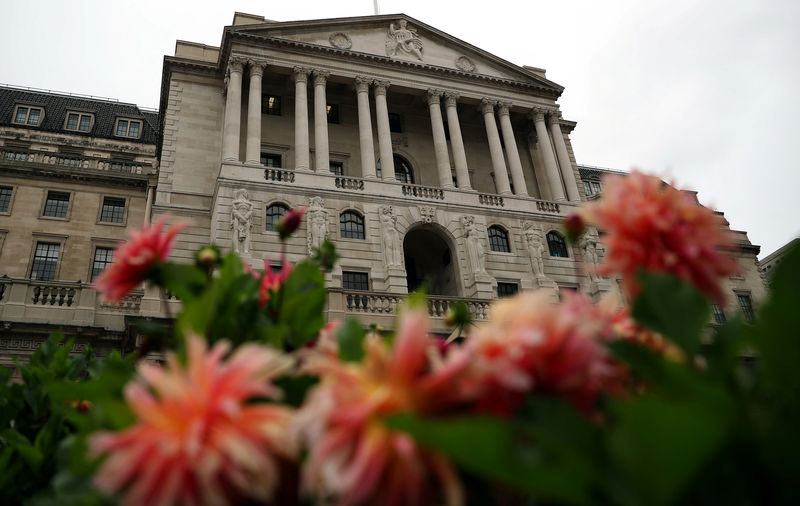By David Milliken
LONDON (Reuters) - The Bank of England must decide how forcefully to talk about the prospect of a first interest rate rise in a decade on Thursday when it will weigh up the need to help Britain's Brexit-bound economy against tackling a jump in inflation
The BoE's policymakers are widely expected to leave rates at a record low 0.25 percent when they make their latest policy statement at 11:00 GMT.
But all eyes will be on its chief economist, Andy Haldane, to see if he switches sides and joins the two members of the central bank's Monetary Policy Committee who have been voting in vain to reverse last year's quarter-point cut in rates.
Haldane was previously known as one of the more dovish members of the nine-strong MPC, but he said in July that he expected to back a rate increase later this year after inflation picked up.
If he moves now, markets are likely to price in a strong chance of a rate hike as early as the BoE's next meeting, in November, potentially unsettling Britain's economy, which has already shown signs of faltering this year.
Most economists polled by Reuters at the end of last month do not expect rates to rise until 2019.
The consensus expectation is for a 7-2 vote on Thursday to keep rates on hold at 0.25 percent, and no change to the 435 billion pounds ($575 billion) of government bond holdings or 10 billion pounds of corporate debt.
The BoE has raised the prospect of rate rises in recent years but not followed through.
Weak wage growth, slower economic activity this year and big questions about what Brexit will mean for Britain's economy mean most policymakers will probably stick with their view that the current surge in inflation is temporary.
"We believe it is highly unlikely that the MPC will raise rates in the next two years given ongoing Brexit uncertainties," said Mike Riddell, a fixed income portfolio manager at Allianz (DE:ALVG) Global Investors.
"Nevertheless, it is possible that the MPC's communications will attempt to jolt the market-implied rate higher."
STERLING STRUGGLES
Sterling fell to a nine-month low against a range of currencies (=GBP) last month. While the BoE does not target sterling, further weakness would cause inflation to move higher above its 2 percent target and increase the risk that the post-Brexit rise in prices becomes longer-lasting.
BoE Governor Mark Carney has said he expects inflation to peak at around 3 percent in October and then fall slowly.
But he has also said a slowdown in investment by companies worried about Brexit meant Britain's economy might be less able to grow without overheating, a warning to investors that a rate hike might come sooner than they thought.
While inflation reached 2.9 percent in August, this was mostly due to the delayed impact of sterling's more than 10 percent fall after last year's Brexit vote, and most of the BoE's policymakers think that effect will fade.
Wage growth could put longer-term pressure on prices, but it undershot expectations in data released on Wednesday. Wages rose just 2.1 percent in the three months to July despite a fall in unemployment to a 40-year low.
Furthermore, the broader economy is showing little sign of picking up after the lackluster 0.2 to 0.3 percent quarterly growth rate in the first half of the year.
UBS fixed income strategist John Wraith this week advised clients to take talk of higher rates with a pinch of salt.
He said financial markets have priced in a greater chance of a BoE rate rise before each MPC meeting this year, only to be disappointed shortly after.
The same seems to be happening this time, with short sterling interest rate futures <0#FSS:> now pricing in a rate rise for August 2018 compared with September 2019 last week.
"Such warnings have failed to gain meaningful traction, as persistently weak economic data has repeatedly undermined the MPC's message," he said.

($1 = 0.7569 pounds)